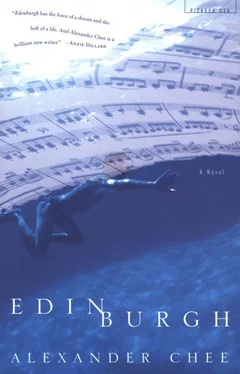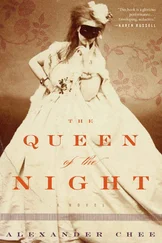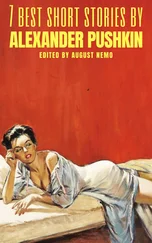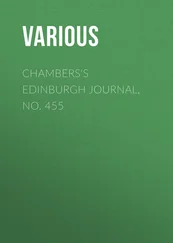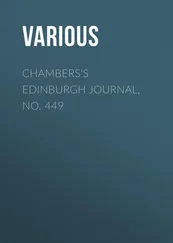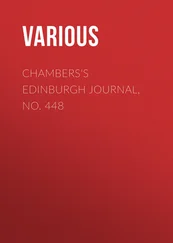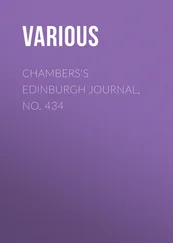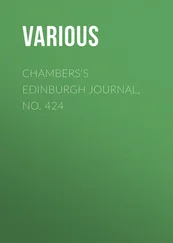Eric Johannsen was naked. Freddy waited to see a rise in his chest, to confirm that he was still alive, and then he looked at Mr. Gorendt, sitting calmly, now pulling a sheet over himself, as if he were cold. He’s sound asleep, Mr. Gorendt said, and dropped a towel over him. Freddy Moran drew back.
I know that if Big Eric had been photographed in that hour he wouldn’t have recognized himself at all. Freddy pretended to be looking for something, and then at the door, he bolted, running, full speed. He knew Big Eric wouldn’t chase him naked. He pounded on the door for Zach to let him in, who did, and he called his mother. I’m okay, he said. I’m not injured or in pain, just scared. At this point, Big Eric was pounding the door, now locked against him, bellowing various threats. Freddy’s mother called the police, who were there in minutes, already having been called by the owners of the hotel, frightened into thinking Big Eric was a stranger. They didn’t, they said, recognize him as being the kind man who had checked in.
The police found Peter and I in the parking lot, where we had fallen asleep, beside each other, between the cars. They had feared on first seeing us that we were dead. Like Freddy thought of Little Eric.
22
I had always wondered exactly how many, had tried to figure it out, but the twelve counts surprised me. Me and almost every friend I had in the choir, except for Merle and Eric B. Adam had been a surprise. He had brown hair, was stocky, was not his type as I had come to know it. He resembled me. Until recently twelve boys represented half the choir. I saw us then in a dim procession, Big Eric was Saturn, he had swallowed us, out of fear and gluttony, and now we marched out of him as out of a cave, and overhead, a now-happy Ralph, winged not like angels but with the tiny brown wings of a sparrow or a phoebe. He would perch, hold the walls tight, as if he didn’t trust his wings to hold him up. When nothing else had.
23
It’s not your fault, my dad tells me.
I can tell, he doesn’t understand. He can’t understand. How it really is all my fault. We are out in back of the house. I can see my grandmother, slicing at her cutting board. I can’t see what she’s cutting, but I can tell she’s cooking something for me. When the first news of the scandal came out in the papers, and Mom and Dad told her, she stayed quiet. She sighed, and it sounded like a sigh that had been learned under a different sorrow. Her face had deepened for a moment then, in a way I had never seen but would see again, many times.
It is my fault, I say.
He draws a deep breath. We love you, Aphias. And we feel terrible, that all of this happened and we weren’t able to protect you. He kneels as he says this, and now our eyes are even.
His eyes dark like the color the Atlantic takes, when there’s no land in sight.
I say it again. It is my fault. It really is all my fault. My face is running wet now. It is all my fault.
And here my grandmother comes running across the lawn. I have never seen her run. She is crying also. And she pulls me into her skirt. Aphias, she says. Aphias. Come in and see what Granmi has made for you. Come in and see.
Peter and I, next to the sea. On a beach in Falmouth, a sand spit. The far water ripples like smoke. It’s over, he says. He’s in jail.
He’s in prison, I say.
Peter had to change schools when the kids found out. He goes to Waynefleet Academy now, a private school in Portland. He helps pay for it by bar backing at his father’s bar. His angel-face now a study in waiting. A man coming on in him, too, there’s added sturdiness now, every month a soft edge loses to a harder one. What do you do, when the criminal goes away? Where’s the rest of the story?
The criminal is still here. Story, here.
The sheet music told us, what you are trying to do, boys have tried to do for five centuries. They used to castrate the boys with the most beautiful voices. We were afraid to find this out, but also, excited. This seemed, if not reasonable, understandable. To always be able to sing like this. Five hundred years of beauty. When I was a boy and I sang, my voice felt to me like a leak sprung from a small and secret star hidden somewhere in my chest and whatever there was about me that was fragile disappeared when my mouth opened and I let the voice out. We learned, we were prisons for our voices. You could want to try and make sure the door was always open. Be like a bell, Big Eric would say. But he didn’t know. We weren’t something struck to make a tone. We were strike and instrument both. If you can hold the air and shake it to make something, you learn, maybe you can make anything. Maybe you can walk out of here on this thin, thin air.
Fifteen. I lose my voice. My new voice sounds like a burned string rubbing. Singing is touching, you bang the air and the air moves something inside you and the thing moved registers, says, That is a sound. When we sing to each other we are touching each other through this sleeve of air between us. When my voice changes I know this new creature is capable of no significant touch, no transformations. This voice cannot erase me, take me over and set me aside. This new voice has no light. It can barely push enough air aside to tell people, Hello, Good Morning, Good Night. I stop talking as much.
I hear my recorded new voice in a tape my school music teacher makes, and it sounds like a stranger. If I called after myself in the street, with this voice, I wouldn’t hear me. I would keep walking, away.
The memory I have of my old voice, the soprano of my childhood, is a memory of desire. For the voice to unstring itself. To rise free of the vocal cords, shed the body like a cormorant sheds the sea after plucking its catch. Not to fly but to be flight, not to carry but to be the carrying.
I go to classes, swim. Swimming is good, shucks me off of me. In the water, nothing. No harm anywhere, and the repetition excites me. Everything, when I feel it, feels bad. The swim team avoids me, even when I win. Zach and I continue to see each other. Peter and I go out with his sister sometimes to “straightedge” shows where no one drinks or does drugs or smokes. Peter lights up only on the way home. He has to change schools now again. Sometimes I wonder if he knew why I always asked him to never tell. Why I helped Big Eric hide in plain sight. I didn’t have an answer for Peter then but he never asked. I have an answer, now.
Hiding him hid me.

Fee
1
The church-choir director’s daughter is the only person who saw him. He had walked to the far edge of the field, burning, unrecognizable, unable to make any sound as the fire took the air out of his lungs. He had set himself on fire and then, perhaps unable to bear the pain while seated, walked, and while walking, Melinda, poor thing, saw him. She was at home, eating some cereal, a few minutes left to her before she was to go down and catch the bus. That morning as he fell to the ground, she left the house to get help, her mother already at the school.
It would have been around seven in the morning on a morning at the end of August, perhaps the last day of the month. Peter had planned his death for two years. In letters sent to his friends, he talked of how he had tried to kill himself for the first time when he was eleven. He had failed and in such a way that no one suspected he had even tried. He resolved then to keep it a secret, and to plan well for the next time. He threw a Dungeons & Dragons game that lasted until late and then we left to go home, as it was the first school night of the summer. He stopped me to take a picture of us together, a Polaroid. Here, he said, and gave it to me, and then laughed. I said, It’s not as much fun to play anymore, is it. And he said, Yeah. It’s not.
Читать дальше
